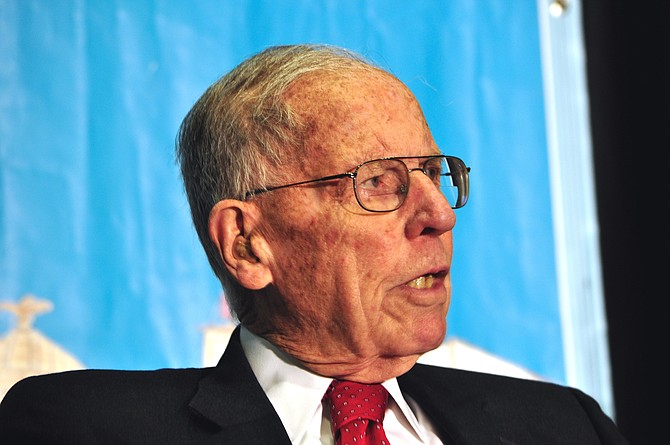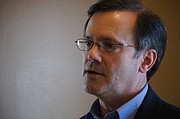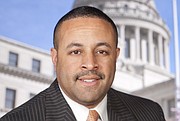Former Gov. William Winter, who served from 1980 until 1984, believes public schools are essential to the prosperity of Mississippians. Photo by Trip Burns.
"If you think education is expensive, try ignorance" reads a sign sitting on former Gov. William Winter's office desk. He keeps it there as a reminder and points to it when asked about the full funding of the Mississippi Adequate Education Program, which the state has underfunded almost every year since its creation in 1997.
A painting of a simple cabin surrounded by trees hangs on Winter's office wall—that's where he received his education in the 1930s. One-room, one-teacher schools were not uncommon in rural areas like Grenada, Miss., where Winter is from. His mother was the teacher at this school.
"That educational background, limited as it was, I think established in me a special appreciation of the importance of making available to every child the opportunity to get the best education they could—and in most of the cases that would be through a system of strong, public education," Winter said of his upbringing.
Back then, public opinion did not support educating all people, in part because the economy depended on the labor of unskilled workers and due to racism. Winter himself talks about being a reformed segregationist.
Between the 1950s and the end of the century, though, appreciation for a superior system of education increased among Mississippians, Winter says. During most of the mid-20th century, white Mississippians supported funding quality public education—as long as schools were segregated racially.
Before the 1954 Brown vs. Topeka Board of Education case, in which the U.S. Supreme Court found segregation of schools unconstitutional, leaders in Mississippi didn't have an interest in "school choice." It wasn't until segregationists lost the battle to keep white public schools white that the attacks on public schools—and the demand for "school choice"—began in earnest.
Avoiding Desegregation
"School choice" is a hot-button political phrase, used in some form since the 1960s. At its most generic, it means giving parents an option of where to send their kids to school beyond the traditional public school of the district in which they live, while still using public dollars, such as with charter schools. In recent decades, "school choice" was a kinder, gentler way to refer to school vouchers, meaning that a family could get a "voucher" for taxes they paid and use the funds at a private school instead, a failed idea that is regaining political traction.
During legal segregation years, it was a ploy called "freedom-of-choice" that Mississippi began to implement after Brown specifically to avoid desegregating public schools. After the 1954 Brown decision, the state of Mississippi first ignored the federal mandate to integrate. But when the 1964 Civil Rights Act passed, Mississippi was at risk of losing its federal funding for public schools if it did not desegregate public schools. In 1965, the state agreed to follow the act, but tried to avoid desegregation in other ways—especially with its "freedom of choice" strategy.
School districts allowed parents to cross district lines when determining where to send their kids to school—black children could go to white schools, but most wouldn't. The African American families who did send their children to white schools were met with the loss of jobs, cross burnings, harassment and eviction. Black families feared for their children's safety in white schools.
"Freedom-of-choice plans left segregated patterns of schooling in Mississippi all but untouched; the reasons had little to do with either freedom or choice," historian Joseph Crespino writes in his book, "In Search of Another Country: Mississippi and the Conservative Counterrevolution."
Private "segregation academies"—which only allowed white students—began to pop up across the state after Brown and especially after the 1970 order from the 5th U.S. Circuit Court of Appeals to desegregate. The greatest hike in private academies was from 1968-1971, in which they grew from educating just over 5,000 to 40,000 students in the state as the court grew closer to forcing southern schools to desegregate in early 1970.
The Citizens Council, a white supremacy group of mostly upstanding businessmen that launched after the Brown decision and was based in Jackson, opened a series of "Council schools" for the specific purpose of keeping schools segregated—especially in the Delta and in Jackson. The Citizens Council, called the "uptown Ku Klux Klan" by Delta Democrat Times Editor Hodding Carter Jr., spread racist vitriol to incite white people and scare them about integration, along with boycotts of and threats to whites who expressed support of integration.
After forced integration in early 1970, funding for public schools started falling out of favor with a large number of whites in the state, many of whom graduated from public schools right here in Jackson.
The effects of this resistance to funding integrated public schools remain today.
Dramatic Massive Flight
Mississippi currently has school choice—for the economically advantaged, that is. Take the city of Jackson—where 97.2 percent of public-school students are African American, and 1.5 percent are white. Generally, parents who have the means to afford a private school won't send their children to JPS—a shift that began when white families pulled their children out of local public schools in the early 1970s here. Many local white students attend Jackson Academy and Jackson Prep, for example, which were founded in 1959 and 1970, respectively, or St. Andrew's Episcopal School, founded in 1947.
"White flight has taken almost all the white children out of the Jackson Public Schools," Winter said. "And you say, 'Well, that's choice.' And we continue to have choice. ... It was the result of the dramatic massive flight in the early '70s ... I wish we had done a better job then of maintaining more of a biracial school system."
The court order forced public schools to desegregate in 1969. It was delayed, as approved by President Richard Nixon in the 1969 school year, but eventually went into effect after the first semester of school that year, creating the most dramatic instance of "white flight" during the Christmas break of 1969-1970.
But efforts to keep schools segregated—either by race or economic status—are not as far in Mississippi's past as one might imagine.
In the late 1990s, the Tunica County School District became embroiled in a legal battle when the state facilitated a plan to help create a segregated school district while developers attempted to construct a new housing subdivision—in which all of the houses would cost more than most African American families could afford—and a new elementary school that would effectively host all white students.
The goal was to create a segregated school in a county that was 80 percent African American where white parents could send their children. A legal team comprised of advocacy groups, civil rights lawyers and legislators fought the construction of the new elementary school, eventually winning and getting the school built closer to the black community.
Forest Thigpen, president of the Mississippi Center for Public Policy, which advocates school choice, believes those motives aren't present in today's arguments against public-school funding. "Those are not the parents who have children in schools now. Those arguments are old arguments that hopefully would not apply today," Thigpen said.
Civil-rights veteran Rims Barber said simply that Mississippi's history of "not doing right by public schools" makes it hard for him to believe advocates for "school choice" today.
"They keep camouflaging it, I'm afraid, so you can't tell what's really going on," Barber said.
When politicians, especially Republicans, cite "school choice," what they probably mean is some form of what David C. Berliner questions in his 1996 book, "The Manufactured Crisis: Myths, Fraud, And The Attack On America's Public Schools."
"What would happen, for example, if, as some Far Right critics urge, the federal and state governments gave up all support for education and control over the public schools were 'returned' to parents and local communities?" Berliner wrote.
Berliner then answered his own question: The result would be chaos. In a purely community-run educational system, what, he asked, would keep schools in a state like Mississippi from becoming entirely dictated by religion rather than education standards?
"American society and industry do not need a population that is ignorant of scientific knowledge, including knowledge about evolution, DNA, genetics, and the inheritance of traits and diseases," Berliner writes.
Not to mention, "giving up governmental control"—many public-school opponents now derisively refer to "government schools"—would also result in the loss of record-keeping and support of school research to make sure educational policies benefit the overall economic growth of the country.
A Choice for the Few?
Today's "school choice" advocates like Grant Callen, founder of Empower Mississippi, claim they don't believe in "doing away" with public schools throughout the state. For some kids, public school works just fine, Callen says.
"This education choice gets labeled: 'Well, you just want to privatize the whole system.' That's not true at all. I don't pretend to think that a private school or a charter school is what's best for every child. I just think the parent ought to have the choice of a private school or a charter school or a traditional public school," Callen said.
Callen said that while public-school advocates complain that "school choice" would create a bigger divide between well-funded, high-performing schools and under-funded, low-performing schools, he's trying to do the opposite. To give "school choice," he said, is to give students who wouldn't have the opportunity to go to the school that best serves them—even if that is a private school—the means to do so.
Fran Leber, vice president of administration for the League of Women Voters of the Jackson area, complains that these "school choice" solutions are not really solutions, because they only cater to a very small percentage of students, leaving the rest with even fewer resources. "When they say 'everybody,' that's not true," Leber said.
Callen says taking students out of schools that don't fit their learning style not only benefits the students who leave, but also the ones who stay. Empower Mississippi uses the Florida model of "special education savings accounts"—a program it adopted this year—to show this.
Only 6 percent of special-needs students left the public-school system in Florida when the state adopted a savings account option, the McKay Scholarship Program, for those students. However, all special-needs students' achievement, even in public schools, improved in the state.
"[T]he positive, but small, improvements in public school student achievement related to McKay competition are consistent with earlier research that finds a weak but usually positive relationship between school choice and public school performance," American Educational Research Association reported. AERA is the nation's largest professional organization focused on the scientific study of education.
Callen says this must be because of the empowerment parents receive when given a choice, even if their choice is to stay at the public school—and because of a little healthy competition.
"Every industry in the world where you have competing service providers and the consumers actually have a choice it makes the quality of the product better," Callen said.
Leber, along with most public-school advocates, doesn't accept this conclusion. "I don't understand their thinking," Leber said. "I think (students at struggling public schools) would have a very difficult time" if students were to leave, taking with them the money for the public-school system, to alternative schools.
The AERA study notes that "school choice" policies can differ: "[I]t is still unknown whether other choice programs, for disabled or other students, would produce similar effects."
Mike Sayer, an organizing and training coordinator with Southern Echo, says getting educational savings accounts for special needs students passed is a way for people with a privatization agenda to "break the mold" that exists currently against vouchers.
"This is the camel's nose under the tent," Sayer said.
Giving Public Money to Parents
Empower Mississippi's priority, Callen said, is helping students who need help most. The group supports legislation for "educational savings accounts"—the ability for parents to use the money the state spends on their child in public school for other educational expenses like private schooling or tutors—for special-education students. One version of this bill, which is a rehash of the voucher effort popular in the 1980s after President Ronald Reagan showed his support of vouchers, was struck down during the last legislative session.
Lt. Gov. Tate Reeves, a Republican who favors "school choice," touted the bill, saying that the "coalition of the status quo" killed the proposal in the House of Representatives last year. He said he will support it again in the 2015 session.
"The needs in our special-needs community are great," Callen said, referring to the especially low achievement of those students—with a 23 percent graduation rate—in Mississippi.
"I think you start somewhere."
Education savings accounts for special-needs students, then, seem like just the "start" for Callen's lobbying group.
While Empower Mississippi is only currently working on savings-account legislation for special-needs students, its overall philosophy—that all students should be able to go to the school that best suits them regardless of economic means—sounds like it would be in favor of giving all students this option in the future.
Callen is careful to use the term "education savings account" instead of "voucher," a word that has fallen out of favor in recent years due to failed voucher efforts.
Thigpen said the special-needs bill works differently than a traditional "voucher"—which is like a certificate of tuition—because not all the money the parent receives has to be spent on the school. It can be spent in a number of different ways, like on tutoring, textbooks, or alternative educational programs and expenses.
But Thigpen also said that choice advocates avoid using the term "voucher" because of the "negative political connotations that have been attached to that label."
Still, "School Vouchers" appears on the Secretary of State's website under current initiatives—Initiative 45. It reads: "Should the Constitution be amended to require the Legislature to develop a system of issuing vouchers for school choice?"
The proposal, sponsored by Lucedale's Josh Hardy, would allow the state to give public-school dollars, in the amount the state spends per child, to the student's parent for them to use on homeschooling costs or private schooling, including in religious institutions.
Many question the constitutionality of such a program or of allowing any public dollars to be redirected to a program or school that pushes any particular religion, from Christianity to Islam—the kind of establishment of religion that the First Amendment expressly forbids the government to do.
"Our Constitution doesn't even allow that because taxpayers deserve to have oversight of the entities that receive public dollars," Nancy Loome, executive director of the Parents' Campaign, said. Put another way, if the "choice" programs are successful, what kind of government oversight, from school testing to bans on public prayer, would need to follow the tax dollars into private and religion-based institutions?
Even the state's constitution forbids a co-mingling of public-education dollars and religion. Article VIII Section 208 of the Mississippi Constitution reads, "No religious or other sect or sects shall ever control any part of the school or other educational funds of this state."
Callen said educational savings accounts don't violate either constitution, even if the private school is religious, because the money is not going to the school itself; it's going to the parent, who then chooses where to spend it. The compelling state interest, in this case, is providing students the education that best suits them, he argues.
Educators such as Enterprise Attendance Center principal Shannon Eubanks worry that this kind of educational policy will not help needy students.
"Most voucher plans will not benefit poor students to go to a private school," Eubanks said. Instead, he says, the state would be supplementing parents who are already economically advantaged to send their student to a private school of their choosing.
As Sayer from Southern Echo points out: How would a private school remain exclusive if it allowed anyone, of any economic background, into it? He thinks those schools would raise tuition to ensure a certain student population.
Abolish Public Education?
Public-school advocates accuse "school choice" proponents of a slippery-slope strategy to slowly but steadily defund and dismantle public education altogether, a strategy that began when white public schools were forced to accept children of color.
But progressives aren't the only ones who are calling foul on the approach. The late conservative columnist Charley Reese wrote in 1993 that "school choice" advocates are tiptoeing around their real intent to privatize education entirely. That, or they've asked the wrong question.
"The correct question is, 'Do you want to offer public education to children?' If the answer is no, then abolish the whole system," Reese writes.
Mississippi has yet to have a state leader say something this direct about education, so Reese's conclusion was this: "But if the answer is 'yes, I want to keep a system of public education,' then you must reject school choice."
Reese blamed neo-conservatives who essentially want to drown government in a bathtub, including public education.
"The neo-cons claim that it would inject the benefits of the free market into the public education system. That's false. It would not because no government program can ever respond like a free-market institution," Reese wrote. "What school choicers really want is the privilege of converting part of the public school system into their own tax-paid private school system."
Voucher advocates don't acknowledge the connection between today's "choice" and the "choice" enacted in the 1960s to avoid integrating schools, but the result of the policy they push is eerily similar: a system "in which private schools serve talented and wealthy students and the increasingly poorly financed schools are left to cope as best they can with the poor and disadvantaged," Berliner wrote in "Manufactured Crisis."
And so often, socioeconomics and race intertwine.
In Berliner's analysis, "school choice" in America would lead to greater inequalities because public and private schools vary so greatly in resources and quality. Drawing on Reese's reasoning, and paraphrasing American economist Alan Blinder, "market forces generate great inequalities—and one wonders how long America could survive as a society if its schools became even less equal than they are today in their funding, staffing, and offerings," Berliner wrote.
Recognizing the history of "freedom-of-choice" in Mississippi is not to say that the current push is racially motivated, at least directly, even if the state's inadequately funded public schools are overwhelmingly African American, many due to white families pulling their children out of them. Rather, those opposed to increased funding for public schools are fine with an education delivery that could result in segregation by class, as well as race as is the case now in resegregated Mississippi public schools.
A system that allowed for a small percentage of students to go to private or low-accountability charter schools, Loome said, would result in a similar kind of divide. "It would be pretty clear pretty quickly that you would have one system that was completely unaccountable that served higher-income children—you would have a class segregation. It wouldn't necessarily be a racial segregation like we saw in the past," Loome said.
Yet, considering that poverty in Mississippi is more prevalent in black communities, due to historic racism, even a class-based segregation would likely hit families of color harder, even if some black families benefit from it.
Still, Callen said this two-tiered system is one that we have now, with economically disadvantaged parents having no choice but to send their kid to the public school in their district, which may be struggling, while wealthy parents can send their children to private schools or move to an area with a better school district.
Loome counters that underfunding is largely to blame for struggling districts—and not helped by the Legislature's refusal to follow the law and fund the Mississippi Adequate Education Program. She recognizes that resources and efforts that could improve achievement in low-income areas cost money—money that most white state officials are just not willing to give public schools.
Then there's the basic math problem: The transfer of students from public schools to alternative schools would only further decrease the funds that public schools receive, because the state determines school funding by how many students each school has. That inevitable outcome thus bolsters the belief of many that the plan is to ultimately cripple the public-school system.
Rep. Chuck Espy, D-Clarksdale, a black supporter of "school choice" through charter schools, said members of the Mississippi Legislature are looking out for the motives of state leaders and will not allow legislation that would take Mississippians back to the educational disparity in the state's history.
"We have so many powerful African American lawmakers. In the state of Mississippi, the Legislative Black Caucus, we are a strong firewall for any injustice ... trust the process that we will be able to decipher any of those hidden pieces of legislation that does anything to hinder our children in the state of Mississippi. So if it's a Trojan horse through school choice, we'll weed it out," Espy said.
Charter Choice
Charter schools—autonomous public schools that are governed by independent boards—make up a more hotly contested element of the "school choice" argument. They have more bipartisan support. In fact, if done correctly, it would be difficult to find an opponent of high-standard, high-performing, free, nonprofit, public charter schools in struggling districts adopted alongside adequate funding of existing public schools. The problem is, few public-school advocates have faith that charter schools will be used this way in Mississippi. Plus, state leaders like to use "school choice" as a way to circumvent full funding of MAEP.
Instead, public-education advocacy groups like Southern Echo worry that these schools would divert much needed and already lacking funds away from the traditional public schools, since the funding follows the student.
Two new charter schools in Jackson—Reimagine Prep and Midtown Charter—would pull a combined $24 million out of JPS funding in the first five years, Southern Echo found.
When students leave to go to charter schools, "it still costs you the same amount of money to heat the building, to operate the building, to operate the buses, to pay the teachers that you need" at the public schools, Sayer said.
Reimagine is an affiliate of the Nashville-based organization Republic Schools, and the Jackson community group Midtown Partners started Midtown Charter.
The Legislature finally adopted a workable charter bill in 2013 after years of consulting and revising. Before this bill, the state's charter-school law, enacted in 1997, only allowed for some existing schools to turn into charter schools, but none of them had done so.
The 2013 bill stipulates that charter schools must be nonprofit organizations, must not charge tuition and must serve at least 80 percent of the under-served student population of the district. Public-school advocates are generally glad that they were able to help revise about the bill before its approval—making sure the schools cannot profit, have a high level of accountability, and that "A," "B" and "C" districts have the power to refuse a proposed charter school.
Charter-school proponents, which include many progressives, recognize issues with the bill. One stipulation of the law, for example, mandates that the only students who can go to a charter school are those within the charter's district. This makes getting a charter school in a small district, where there are not enough children to pull to the charter from the existing schools, difficult.
Mississippi, while late in the game, has a kind of upper hand because there are so many successes and failures in other states to draw lessons from.
Rep. Espy said his support of charter schools began after listening to and having conversations with President Barack Obama about them.
"He thought that this was an avenue to give parents a choice for their children," Espy said about the president. Roughly 12 years ago, Obama inspired Espy with a speech about inner-city and rural students who don't have the resources to send their children to alternative schools.
Espy began comparing the use of charter schools against each other to determine how they can be best used. In 2007, Espy visited the graduation ceremony of the KIPP charter school in Helena, Ark., which had an enrollment of 99 percent African Americans and "look(s) like our Mississippi Delta," he said.
What he saw brought tears to the eyes of the parents in the audience—many of whom had never been to college. Every student who graduated received a scholarship to a four-year institution. KIPP was successful in an area similar to the areas struggling in Mississippi, and Espy wants to test its model in his state.
But Espy wants more out of charter schools than just giving the state's children an alternative option to public schools.
"This has always been my hope for charter schools in Mississippi: that we only have to open a few charter schools and if they are able to prove what they've proven over in Helena, Arkansas, with the KIPP charter school ... and we're able to have their success ... we will begin to craft legislation that will give the same autonomy to the public-school system and hopefully, and this is my hope, that we will never have a need to open another charter school," Espy said.
Funding vs. Choice
With an already underfunded public-school system, implementing school-choice measures could be detrimental to existing districts.
"We're not looking at making those decisions on school choice ... based on academic reasons solely, but we're doing it based on privatization," Eubanks said. He added that he worries alternative schools will open up the opportunity for organizations to profit from providing a subpar education.
While the Legislature refuses to fully fund MAEP, opponents of greater funding use "school choice," including charter schools and vouchers, as a smokescreen, claiming "choice" is the solution to the state's education woes—not money.
"We have questions about the formula itself, but our main point would be that there's no evidence that spending additional money will improve the educational outcomes of the students," Thigpen said. Thigpen said he believes public schools can be successful in Mississippi, but refuses to advocate full funding of MAEP, which is what the Legislature determined is needed for an adequate education. It's curious to most public school advocates why most proponents of school choice—especially those who say they don't want to do away with public schools—don't support adequate funding, as defined by MAEP, for public schools.
Students need the resources outlined in MAEP, which is the formula that determines how much money is necessary for students, especially economically disadvantaged ones, to get an adequate education. The point is to bring underfunded districts—many of them majority non-white—up to at least an "adequate" funding level to reverse the inequities left in the districts after white families fled public schools by the 1960s.
No amount of school choice, public-school advocates say, will make up for that loss in funding for the public schools that remain.
Winter, known as the education governor, said school choice is "not the silver bullet" for public education.
Rims Barber, the civil rights veteran, is even more direct. The fact that "school choice" proponents don't support greater funding for public schools—which are traditionally underfunded—proves that they are ultimately undermining the public school system, by "talking this other game," Barber said. "I just don't believe it."
It seems to Barber that these politicians are driven by something more sinister: "If society is only for those who can grab the most, then it's really not worth having," he said.
Mississippi has yet to see if "school choice" can coexist with flourishing public schools, but what's certain to the most esteemed education advocates in the state is that public schools are essential to building ideal communities.
"This country is built on democratic values, and I think those values can be best taught and best learned when everybody goes to school together—across all classes and races and religions and the other elements that make us such a diverse country," Winter said.
Correction: An earlier version of this story misstated that an all-white school board in Tunica County tried to construct a new middle school near an upscale housing division. The school board was not all white at the time. Also, the Tunica school referenced in the story was an elementary school, not a middle school. The Jackson Free Press apologizes for the errors.







Comments
Use the comment form below to begin a discussion about this content.
comments powered by Disqus